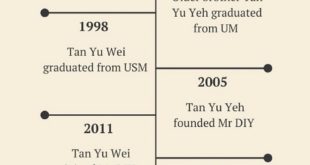Head into a Malaysian mall, and chances are that you’d see a Mr DIY shop. It’s pretty much become a staple in many of our malls.
In July 2005, it was just a single hardware store along Jalan Tuanku Abdul Rahman. But by the end of the first year, it had grown and was operating 3 outlets.

Just within 15 years, Mr DIY now has a network of 674 stores and is the largest home improvement retailer in both Malaysia and Brunei.
One might wonder if the aggressive expansion has led to the brand suffering financially, but on the contrary, it reported a 14% year-on-year increase in net profit from RM308.33 million to RM317.57 million in FY19.
Headed To The Malls
In an interview with The Star in 2016, Andy Chin, then-senior marketing manager, now-Marketing VP at Mr DIY, shared that growing the business had always been in the plans from the get-go.
With that in mind, they’d invested in a point-of-sale (POS) system in order to facilitate an easy and efficient expansion.
It worked, and the company began experiencing rapid growth after stepping foot into malls in 2010.
Mr DIY’s entry into malls marked a new trend for the company, evolving into an anchor tenant from its previous standalone shops model.
Since it’s forged partnerships with large retailers such as Tesco, Giant and Aeon, you’d be hard pressed to find one of these malls without a Mr DIY.

Andy told The Star, “Some might say we are partnering with the competition, but we believe that we are filling a gap in their businesses.”
“Our stores are a one-stop centre for everything that a home could need—except groceries, which is the specialty of the large retailers,” he added.
Smart Strategies Set Their Path
Mr DIY’s iconic motto is “Always Low Prices”, and this is just another factor that adds to their attractiveness.
In the aforementioned The Star interview, Andy revealed how they’re able to stick to the motto.
“We looked at successful businesses in developed countries for inspiration. For instance, we found that in Japan, healthy competition in the market kept prices low, which was a means of attracting customers. It was a good lesson.”
“Other strategies we have employed include purchasing in bulk or even giving purchase volume commitment, not purchasing on credit and doing our own logistics,” he shared.
Doing the latter actually brought their logistics cost down from 5% to 1% then.
Thanks to strategies like these and more, the company is able to continue its growth full speed ahead, even during the pandemic.
This September, amidst the rising number of pay cuts, layoffs, and store closures, Mr DIY grew the number of its stores nationwide by 33.
So, what’s the secret behind this strong growth trend? The Star sought out the answer to this in another interview with Andy.
He told them that it was the company’s ability to react quicky to changes in the market.
“For a big organisation, it’s usually hard to move with that much agility, as it tends to be more conservative with a long decision-making process. Hence it is slower in responding to the market.”
“We react pretty quickly, because we’re a homegrown brand that understands the market. So that’s a core advantage of our business in Malaysia,” he added.
Taking & Providing Opportunities
In 2017, Mr DIY launched its e-commerce business to bring in offerings to the market that were deemed “unsuitable” for their retail stores.
This move paid off, especially so during the MCO, as they were able to remobilise employees to fulfil online orders and continue bringing in revenue.

“E-commerce doesn’t cover all the things we sell in-store—such as fragile items—but it enables us to serve a different group of customers,” Andy shared with The Star.
By employing the click-and-collect model, customers were able to order their goods online and select which outlet they wanted to pick the items up from.
As Mr DIY grows its business, it needs manpower. In July, the company kickstarted a nationwide recruitment campaign offering 1,000 job vacancies.
Within 2 weeks, it received more than 8,000 applications comprising unemployed persons, fresh graduates, and talents from the disabled community.
By the end of this year, Mr DIY will start another campaign to fill in more positions.
Knowing What The People Want
The rapid growth of the home improvement retailer has led some to wonder about self-cannibalisation, but it doesn’t appear to be an issue for them.
New Mr DIY outlets are opened based on actual market demand, determined through a mixture of in-house analysis of self-collected data and business acumen.
“Our market research is quite extensive and is based on raw data that we collect from our activities, as well as from sales.”
Generally, once we have learnt what works for a certain kind of localised market, based on location, surrounding population demographics, etc., we will apply the same logic to a store in an area with similar circumstances,” Andy told The Star.
Thus far, this has worked well for them.

Aside from Mr DIY, the company also branched out into other businesses, namely with the launch of Mr TOY in 2019, a home-grown toy store chain now with 28 stores, and Mr DOLLAR in 2020, a dollar-store concept where everything is RM2 or RM5.
No Signs Of Slowing Down
Mr DIY’s market capitalisation of RM10 billion has made it even more valuable than Malaysia’s airport operator, MAS, and even our national postal service provider, Pos Malaysia.
The only other household names that have a higher market cap than Mr DIY are Telekom Malaysia, Fraser & Neave Holdings, Genting, and Genting Malaysia.
The home improvement retailer also now has the largest IPO on Bursa in 3 years, aiming to raise RM1.5 billion from its listing.
They’re showing no signs of slowing down in any department, and are aiming to have 900 stores across Malaysia and Brunei by the end of 2021.
Featured Image Credit: Mr DIY via SG Magazine



